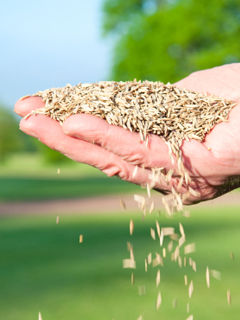Pro Lawn Care
Friendly, Professional CARE for
Your great Outdoors all year long.
Useful Advice Fall
Prepping your lawn for winter
Now that temperatures are falling, it's time to think about lawn winterizer. Winterizing your lawn consists of just a few basics that will make all the difference for you next spring.
Fall Lawn Winterizer Fertilizer
The first thing to consider is your lawn's root health in regards to nutrients. I always recommend a final application of fertilizer around October or November. The fertilizer you choose should be a mix contain some nitrogen, but more concentrated with potassium and phosphorus. These last two elements strengthen the lawn's root system which does most of its thickening in the cooler fall months.
A good analysis will look like this: 20-20-10 or 15-15-15. You may not find those exact analysis, but get something similar.
Fall Lawn Aeration
Aerating the lawn is very important also and should be performed on healthy lawns, as well as thin ones. Aeration loosens up compacted lawn soil and allows the nutrients from your winterizer fertilizer to get to the root system. It also helps break down the thatch layer that accumulates during the hot summer.
After your aeration, it is a great time to put down some fresh grass seed. Many people are confused about what type of grass seed to use. If you are unsure, you can take a sampling to your local university extension for proper identification. Otherwise, you should buy good quality bluegrass and perennial rye grass mix for summer areas, and fine fescue for shady areas. These general seeds will mix with most lawn types just fine.
Final Lawn Mowing
Everyone wants to know when they are done mowing for the year and what they should do for that last cut. It's simple: your last mowing should be when day time temperatures are consistently in the mid-40s. In addition, you should mow your lawn 1 inch lower than normal on the final cut. This is because snow will pack down on it and if it is too long, the blades will die and leave heavy layers that you will have to rake out in the spring.
Lastly, you should consider buying driveway ice melter and snow melter early this year. I have been in touch with my suppliers, and they are already predicting a shortage. You should never use too much ice melter on your driveway or sidewalk because it can harm the grass. Always follow the labeling. Most safe deicers and snow melters with calcium chloride will be best for you grass, trees and shrubs and concrete surfaces.
Don't forget to perform these lawn winterizing steps before the first snowfall. A little extra attention now will definitely pay off for you in the spring of next year.


